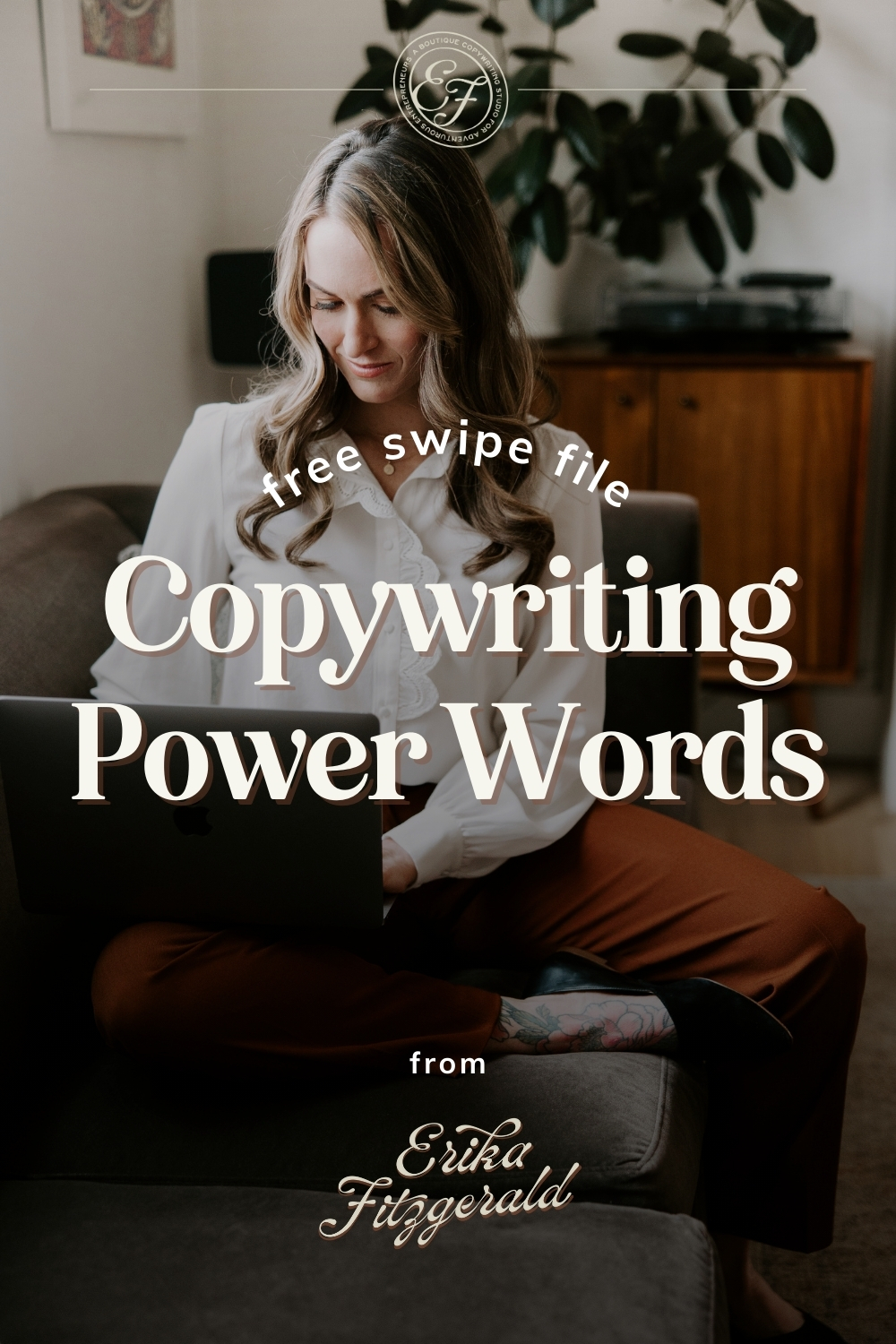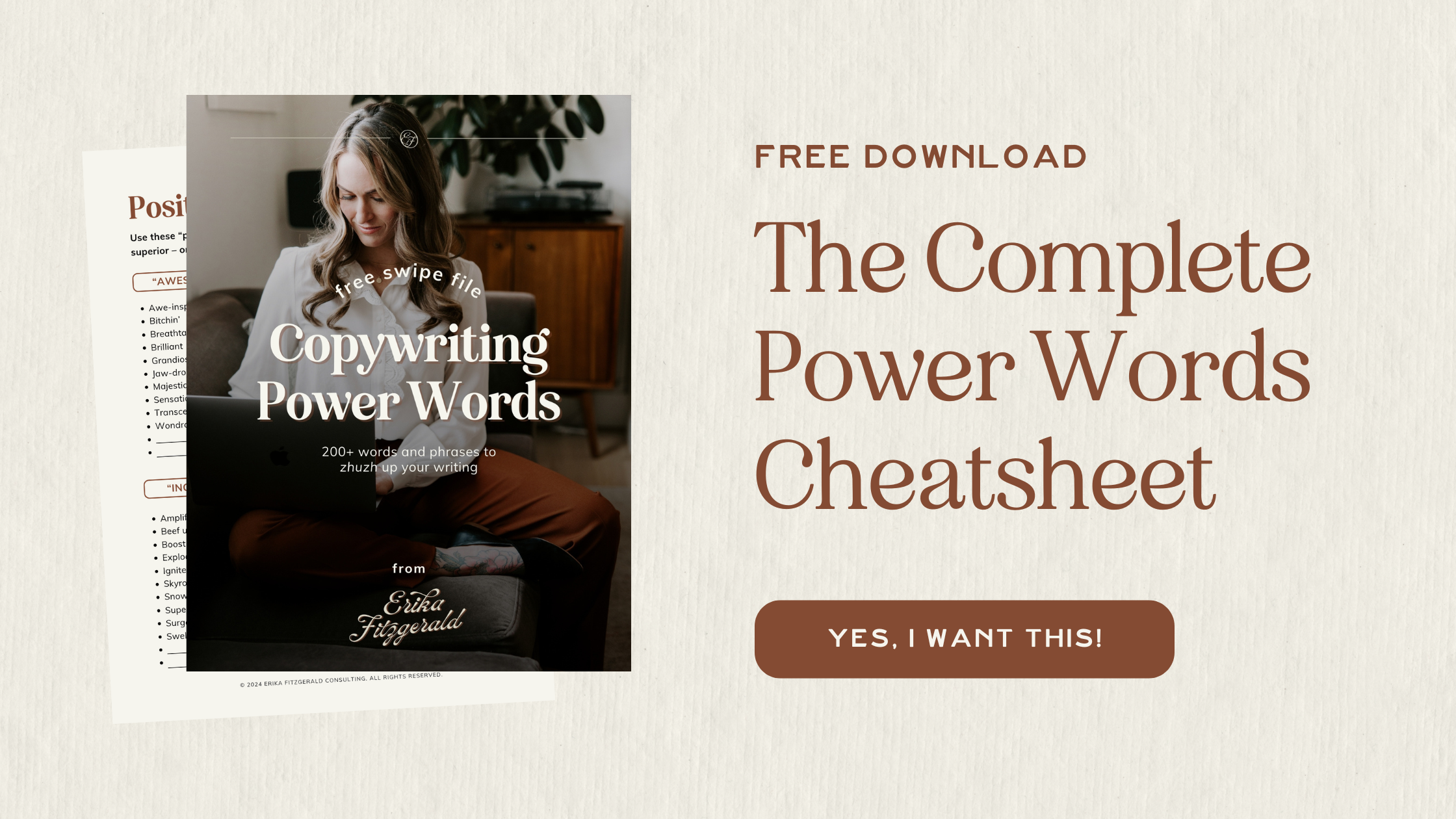When we talk about conversion copywriting, we’re talking about persuasive writing. That is – writing that moves people to take a desired action, such as subscribe, buy, or contact.
The first goal of persuasive writing is to capture the attention of distracted internet browsers. The next goal is to keep their attention.
To do that, your copy must pull an emotional lever. We call this a “hook.” You have about three seconds to capture someone’s attention, so your hook needs to pack a punch. The easiest way to do this is by swapping basic words for copywriting power words.
What are copywriting power words?
In copywriting, power words are less common replacements for basic words. Power words paint a picture that pulls readers in, making them more persuasive by nature. Whereas people often gloss over common words like “huge,” “great,” “best,” and “unique” because they’re vague and overused.
- Power words make a
bigimpact. - Power words make a Costco-sized impact.
When you read “big” – well, there are lots of “big” things. It’s hard to picture just one BIG thing. But when you read “Costco-sized,” you picture extra-large everything.
Because power words are more descriptive, they’re more likely to capture attention and pique your reader’s interest. They tell a story.
With AI on the rise, taking the time to spruce up your writing pays off. ChatGPT – I use it; there’s a time and a place – but it spits out A LOT of basic words. So, if you want your writing to stand out and sell, swap in some power words.
Real quick – download this list and get even more power words for free. We’re talking 200+ total.
The 5 most powerful words
Classic like a pair of Levi’s, these are the five most powerful words in the English language. They just work.
- You
- Free
- Because
- Instantly
- New
70 Power words to replace basic words
Use this list of power words to get the creative juices flowing whenever you feel stuck or need a shot of inspiration.
Instead of “Huge”
- Astronomical
- Colossal
- Earth-shattering
- Extensive
- Hefty
- Massive
- Monumental
- Off the charts
- Tremendous
- Whopping
“Great”
- Cult favorite
- Dandy
- Mind-blowing
- Noteworthy
- Popular
- Powerful
- Superior
- The bee’s knees
- Tip-top / top-notch
- Whale of a…
“Best”
- Best in class
- Choice
- Cream of the crop
- Crème de la crème
- Elite
- First-class / First-rate
- Five-star
- Prime
- Second to none
- Top-shelf / Top-tier
“Unique”
- Custom
- Distinctive
- Exclusive
- Novel
- One and only
- Quirky
- Rare as hen’s teeth
- Snowflake in summer
- Sui generis
- Unicorn
“Easy”
- Breezy
- Child’s play
- Cinch
- Easy-peasy
- Effortless
- No sweat
- Piece of cake
- Smooth sailing
- Stress-free
- Walk in the park
“Difficult”
- A mile a minute
- Breakneck
- Drop of a dime
- Immediate
- In a flash
- In the blink of an eye
- Lickety-split
- Prompt
- Streak of lightning
- Swift
“Launch”
- Coming soon
- Counting down to [date]
- Debut
- Doors open [date]
- Dropping
- Premier
- Release
- Reveal
- Unveil
- Walking the red carpet on [date]
50 power words for persuasive writing
Use these power words when you need your copy to achieve a specific goal.
Create a sense of urgency
- Doors closing
- Ends soon
- Flash sale
- Going, going…
- Hurry
- Immediately
- Last call / Last chance
- Limited time
- Now
- Today
Create a sense of exclusivity
- Competitive
- High-end
- Insider
- Invite only
- Members only
- Premium
- Secret
- Society
- Velvet rope
- VIP
Reduce risk
- Cancel anytime
- Free returns
- Free trial / Free test drive
- Full refund
- Happiness guarantee
- Hassle-free
- Money-back guarantee
- No questions asked
- Pay-as-you-go
- Secure
Build trust
- Backed by…
- Best-selling
- Certified
- Endorsed by…
- Proven
- Signature
- Support
- Tested
- The original
- Trusted by…
Inspire action
- Bonus
- Count me in
- Discover
- Explore
- Free? Sign me up!
- Invest
- Join
- Peek inside
- Save
- You ready?
Watch out for fake power words
The point of persuasive words is to paint a picture for your reader. Aim for clear, descriptive, and thought-provoking language.
That said – there are a lot of overused marketing buzzwords that sound powerful but don’t mean anything to readers. Words like:
- Accelerate
- Activate
- Amplify
- Elevate
- Ignite
- Innovative
- Jumpstart
- Revolutionize
- Transform
- Unleash / Unlock
- Uplevel / Level-up
A note on using power words
Yes – power words make for more engaging and persuasive writing. However, not every word needs to be powered up.
Like basic words, power words lose their oomph with overuse. Use them where it feels most natural and impactful.
You don’t want your copy to read like a textbook or thesaurus – and you definitely don’t want to confuse your readers. So, use your power words to capture attention where it matters most:
- Headlines
- Sub-headlines
- Calls to action
- Subject lines
If you thesaurus-ify everything, you risk confusing your readers. Always strive for clarity first – then layer in creativity. The most effective copywriting is clear, simple, and specific.
Remember – the end game is to sell your product or service. Your prospects are scanning for solutions. So don’t bore or bog them down with complicated writing.
This is by no means an exhaustive list of persuasive words. Use your creativity to curate your own word bank using idioms, similes, and pop culture references that work with your brand voice. (If you need help with that, snag my free brand voice guide.)
Want more copywriting goodness?
Here are three ways I can help:
-
- Custom website copywriting: Are you “so over it” the second you sit down to write stuff for your website? Tap me in – I’d love to be your go-to website copywriter for the day or your next launch. Browse copywriting services →
- My free email newsletter: Where I send bite-sized copywriting tips, inspiring stories, and unsolicited business advice to 1K+ readers on a weekly-ish basis. “Ooh, I love free advice, sign me up” →
Love this post? Pin it for later 👇


Very Good!
Thank you, Wendy!
Super useful guide to engaging terminology. Admittedly, I can probably pull back on using “innovative” and “passionate.” It’s not that I have a problem backing up this verbiage but rather the frequency and how much it pops up throughout my copy. Thanks!
Yay, happy to help! An occasional “innovative” or “passionate” never hurts – but switching up the verbiage in any copy is a great way to keep readers engaged.
This is quite helpful – thank you! I would be thrilled if you’d write a guest blog post for my site, which is for writers. If you think it might be fun or helpful to have my followers (who total about 10k across my various social media) meet you- best, da-AL